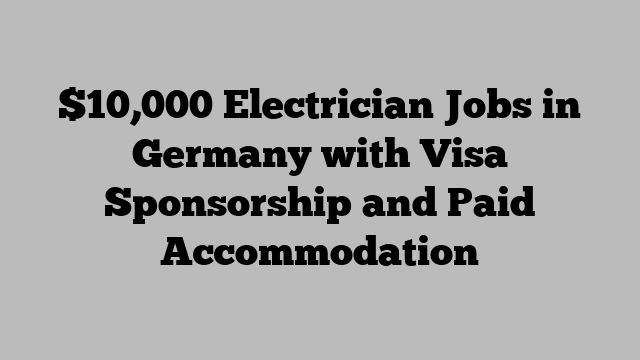$10,000 Electrician Jobs in Germany with Visa Sponsorship and Paid Accommodation

Germany is one of the largest industrial powerhouses in the world, with a growing demand for skilled tradespeople—especially electricians. With aging infrastructure, a focus on green energy, and continued expansion in residential and commercial construction, the country is facing a shortage of qualified electrical workers.
To fill this gap, Germany is offering visa sponsorships, free or subsidized housing, and long-term contracts to attract foreign electricians. In 2025, this presents a golden opportunity for skilled workers from non-EU countries to start a well-paid and legal career in Europe’s strongest economy.
This guide covers everything you need to know to apply for electrician jobs in Germany with full immigration support.
Why Germany Is Hiring Foreign Electricians
There are several reasons Germany is opening its doors to foreign electricians:
- Retiring skilled workers and declining vocational interest among youth
- Government investment in renewable energy (solar, wind, EV infrastructure)
- Growth in real estate development and urban renovation
- Skilled trades included in Germany’s Shortage Occupation List
By 2025, employers are prioritizing recruitment from abroad—particularly Africa, Asia, and Eastern Europe—offering visa support and full-time employment contracts.
Types of Electrician Jobs Available
Germany’s job market for electricians is broad and includes opportunities in residential, industrial, and commercial settings.
1. Residential Electricians
- Install and maintain home wiring, outlets, circuit breakers
- Set up lighting systems and smart home tech
- Perform safety inspections and code compliance
2. Industrial Electricians
- Work in factories and plants
- Maintain electrical machinery, motors, and power systems
- Troubleshoot industrial equipment
3. Construction Site Electricians
- Install electrical systems in new buildings
- Work alongside plumbers, carpenters, and engineers
- Set up temporary power on site
4. Solar and Renewable Energy Technicians
- Install solar panels and battery systems
- Configure inverters and energy monitoring systems
- Often part of Germany’s energy transition program
5. EV Charging Infrastructure Installers
- Set up electric vehicle (EV) charging stations
- Work with commercial and residential clients
Who Can Apply?
Germany accepts skilled workers from non-EU countries through its Skilled Workers Immigration Act (Fachkräfteeinwanderungsgesetz).
Eligible Applicants Include:
- Citizens of Nigeria, Ghana, Kenya, India, Nepal, Pakistan, Bangladesh, the Philippines, Egypt, and other non-EU nations.
- Vocational electricians with:
- A diploma or trade certificate (minimum 2 years)
- Work experience (2+ years preferred)
- Good physical health
- Clean police record
- Basic German (A2-B1 preferred, but many employers assist with training)
Salary Expectations in 2025
Germany pays skilled tradespeople well, with additional benefits like overtime and holiday pay.
- Entry-level Electricians: €2,400 – €2,800/month
- Mid-level Technicians: €2,800 – €3,400/month
- Experienced Industrial Electricians: €3,500 – €4,200/month
Salaries vary based on region (higher in cities like Munich and Hamburg), certifications, and experience.
In addition:
- Overtime pays extra
- Employers contribute to healthcare and pension
- Paid holidays: 20–30 days per year
Additional Benefits
Many employers offer:
- Visa sponsorship and legal work contract
- Free or subsidized housing
- Transport allowance or company vehicle
- Tools and work gear provided
- German language classes
- Training on European safety standards
Some companies offer family reunification assistance after probation periods.
Work Visa Process for Electricians
Germany’s visa system for skilled workers is streamlined and efficient. Here’s how it works:
Step 1: Qualification Recognition
Germany requires foreign vocational qualifications to be recognized (anerkannt). You’ll need to apply through:
- BQ Portal (bq-portal.de) or
- Recognition in Germany (anerkennung-in-deutschland.de)
Required Documents:
- Diploma/Certificate of electrician training
- Transcripts or syllabus (translated to German)
- Passport
- Work experience letters (if available)
Once approved, you’ll receive a Recognition Certificate.
Step 2: Job Search
Apply to verified employers offering sponsorship. Most will only consider applicants with:
- Recognition certificate (or conditional approval)
- Basic German (A2 level or higher)
- Updated resume and references
Step 3: Receive Job Offer
Once selected, the employer sends you:
- Employment contract
- Proof of accommodation
- Invitation letter (if training is offered)
Step 4: Apply for Visa
Submit application at your local German embassy or VFS Global office. Processing time is typically 6–12 weeks.
Step 5: Travel and Start Work
After visa approval, fly to Germany and begin onboarding with your employer.
Where to Find Jobs with Visa Sponsorship
Job Portals:
- Make-it-in-Germany.com – Official government platform
- Jobbörse der Bundesagentur für Arbeit (arbeitsagentur.de)
- StepStone.de
- Indeed Germany (de.indeed.com)
- LinkedIn (filter for “visa sponsorship”)
Recruitment Agencies:
- ZAV (International Placement Services)
- GerMed International
- Handwerkskammer (Chambers of Crafts)
- Advisa Group
- Arbeitnow
Search using keywords like:
- “Elektriker mit Visum”
- “Electrician job Germany visa support”
- “Skilled trades Germany”
Tips for CV and Application
- Use a Europass CV format
- Clearly list qualifications, skills, tools used
- Highlight international work experience (if any)
- Include professional references and project descriptions
- Mention German proficiency level (even if beginner)
If your German isn’t strong, express willingness to learn—it shows commitment.
German Language Requirements
While not always mandatory, most employers prefer workers with basic German. A1–A2 is acceptable for many roles, but B1 improves job placement and promotion chances.
Language support:
- Some employers offer paid German courses
- You can also learn online before applying (Goethe-Institut, Duolingo, Babbel)
Working Conditions
Germany is known for:
- Strict safety standards
- Regulated working hours (35–40 hours/week)
- Punctuality and precision
- High-quality tools and equipment
- Union support in many sectors
Work is typically structured in shifts and follows a strong work-life balance culture.
Cost of Living in Germany
With employer-subsidized accommodation, living in Germany as a foreign worker is affordable.
Average Monthly Expenses:
- Shared housing (company provided): Free or €300–€500
- Food: €250–€400
- Transport: €60–€100 (monthly pass)
- Health insurance: Covered by employer
- Phone/Internet: €30–€50
Cities like Berlin, Dresden, and Leipzig are more affordable than Munich or Frankfurt.
Long-Term Opportunities
- After 4 years of work, you can apply for permanent residency
- You may also bring your family under family reunification
- Eligible for citizenship after 5–8 years with integration
- Transition to self-employment or contracting possible
With good German skills and advanced certification, electricians may become foremen, supervisors, or safety officers.
Avoiding Scams
- Do not pay agents large fees upfront
- Always verify job offers on official German platforms
- Ensure your employer is registered and accredited
- Never send original documents without confirmation




